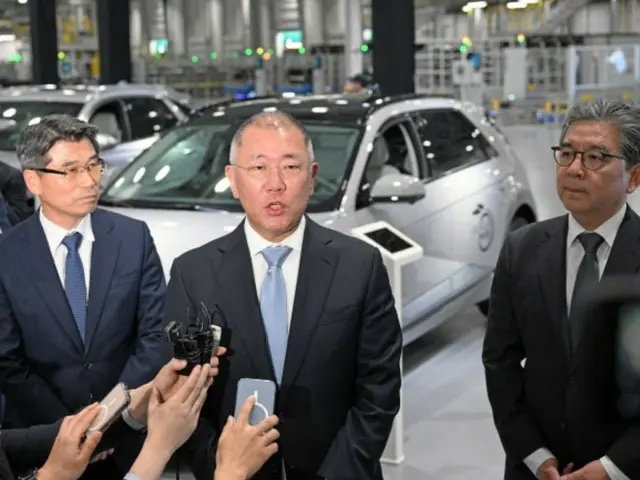However, the tariff policy decided by President Trump showed no consideration for South Korea. President Trump reiterated his stance of imposing tariffs on automobiles imported into the United States.
President Trump stressed the importance of the trade war with the US, and the automobile industry, South Korea's largest export item to the US, fell into a "zero visibility" situation. On the 26th, President Trump announced in his White House office that "imported cars will be subject to tariffs from April 2 to 25."
"We will impose a 100% tariff on imported goods," he said, and signed the executive order, stating that "global automakers will build factories in the United States." In addition to steel and aluminum, additional tariffs on individual items were announced.
The opening ceremony for Hyundai Motor Group MetaPlant America, which was built in Ellabal, Georgia with an investment of $5.5 billion, was held at the same time.
At the same time, President Trump spoke decisively, saying, "We will exact a cost from those nations that do business in our country and take our jobs and our wealth," and that "our friends are often far worse than our enemies."
"And this measure is very mild," he said. He also noted that the auto tariffs will be permanent. This is because the auto tariffs are related to steel and aluminum.
This is seen as a way of drawing a line under the idea that the measure is not something that can be negotiated like a tax. If the US, the largest export market for South Korean cars, were to take such measures, it would inevitably have an impact.
According to the report, South Korea's automobile exports to the United States in 2024 will be $34.744 billion (approximately 5.24 trillion yen), with the United States accounting for 49.1% of South Korea's overseas automobile exports.
The number of automobile exports from South Korea to the United States has been increasing year by year. According to the Korea Mobility Industry Association, South Korea's automobile exports to the United States are expected to increase from 820,000 units in 2020 to 1.43 million units in 2024.
According to a Citigroup report, "The United States is the largest export market for Korean automakers and is the fourth largest exporter of passenger cars to the United States," and "The Korean auto industry is a major player in the steel, building and construction industries."
"Because it is linked to various industries such as batteries, petrochemicals and electronics, the knock-on impact on other industries will be significant."
Hyundai Motor Group, which has made large-scale investments in the United States, is also
The impact of President Lee's decision cannot be escaped. Hyundai and Kia exported 630,000 and 380,000 vehicles to the U.S. last year, respectively, for a total of 1.01 million vehicles.
Through this investment in the U.S., the company will add a new production line capable of producing 200,000 units per year to its new Georgia plant, which has an annual production capacity of 300,000 units, thereby increasing its U.S. production capacity to 1.2 million units per year.
A simple calculation would mean that exports to the U.S. would fall to about 800,000 units per year. The Hyundai Motor Group will be less affected than its rivals, who will find it difficult to immediately increase production facilities in the U.S.
However, the imposition of a 25% tariff on 800,000 vehicles exported per year is a major blow. Moon Young-kwon, a researcher at Shinyoung Securities, said, "This will have a significant impact on automobile production and exports.
"It is inevitable," he said, adding, "In particular, the more local production in the U.S. increases, the more inevitable it will be for the number of vehicles exported to the U.S. from domestic factories to decrease."
Experts say the key to overcoming the barriers posed by the Trump tariffs is whether or not they can provide cheap, high-quality products.
For this reason, the report recommends that policy support is needed to improve South Korea's domestic production environment for investment in next-generation electric vehicles and digitalization.
"Even if the US imposes a 25% tariff on imported cars, it won't be impossible to produce and export them domestically in South Korea," said Cho Cheol, a research fellow at the Korea Institute for Industrial Economics and Trade. "President Trump has said that all major car parts will be imported.
"Because of the tariffs, sales prices in the U.S. will probably rise by at least 10% to 15%," he said. "We are working to reduce sales prices by 5% to 10% from the research and development stage onwards."
"We need active policy support right up to production," Cho said. "The trend toward digitalization in the global automotive industry is a threat to the Korean automotive industry, but it is also an opportunity."
"If we can respond well to the current 'Trump Crisis' era in which the entire automotive industry is suffering, it will be an opportunity for us to make further leaps forward," he added.
Meanwhile, Chairman Chung Eui-sun said at the completion ceremony for a new factory in Georgia on the same day, "Not only companies, but the Korean government is also actively involved in negotiations regarding tariffs.
Chairman Chung added, "Tariffs are a major issue between countries, so no matter what strategy a company adopts, it cannot expect a big effect.
"However, negotiations should not just be conducted by individual companies, but should also be led by the government, and this is the beginning," he said.
"I think the period from the 2nd onwards will be a very important one," he added.
2025/03/28 07:14 KST
Copyrights(C) Edaily wowkorea.jp 107

